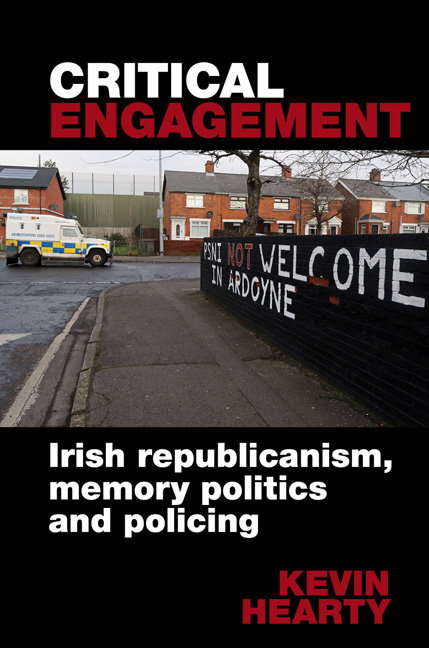Book contents
- Frontmatter
- Contents
- Acknowledgements
- List of Figures and Tables
- List of Abbreviations
- Introduction
- 1 Understanding a Fraught Historical Relationship
- 2 Irish Republican Memory as Counter-Memory
- 3 Ideology and Policing
- 4 The Patriot Dead
- 5 Transition, ‘Never Again’ and ‘Moving On’
- 6 The PSNI and ‘Community Policing’
- 7 The PSNI and ‘Political Policing’
- Conclusion
- References
- Index
2 - Irish Republican Memory as Counter-Memory
- Frontmatter
- Contents
- Acknowledgements
- List of Figures and Tables
- List of Abbreviations
- Introduction
- 1 Understanding a Fraught Historical Relationship
- 2 Irish Republican Memory as Counter-Memory
- 3 Ideology and Policing
- 4 The Patriot Dead
- 5 Transition, ‘Never Again’ and ‘Moving On’
- 6 The PSNI and ‘Community Policing’
- 7 The PSNI and ‘Political Policing’
- Conclusion
- References
- Index
Summary
Introduction
The previous chapter established how policing lay at the heart of the conflict in Northern Ireland. Unsurprisingly, the legacy of policing remains contested during post-conflict transition. This is symptomatic of the general fact that all transitioning societies witness contestation between parties to the conflict who are determined to broadcast their own narrative. More specifically, it reflects how views of policing in the North of Ireland were/are inextricably linked to differing political perspectives. During the conflict, this was played out through the ‘legitimacy politics’ of police and state legitimacy, but in transition contestation – between even if not within opposing ethno-nationalist blocs – is played out through the memory politics of what policing was, rather than what policing is. The memory politics of policing gravitate around competing narratives that are either favourable to or condemnatory of the RUC. These narratives are hardly apolitical; they are engineered through deliberately selective ‘forgetting’ and ‘remembering’, articulated with present political needs in mind and endowed with post-conflict political functionality. To grasp the veracity of this, it is necessary to evaluate the interplay between ‘narrative substance’ – what the narrative says – and ‘narrative context’ – why it says this – that defines memory politics in Northern Ireland.
Substantively, opposing narratives articulate the ‘remembered past’ rather than the ‘actual past’. Unlike the ‘actual past’, which is susceptible to natural processes of forgetting, the ‘remembered past’ is manipulated through selective ‘remembering’ and ‘forgetting’ processes that feed into collective memory, political identity and group boundaries. As such, the ‘remembered past’ is integral to engendering feelings of injustice, a sense of victimisation and the apportioning of blame to the ‘other’. The ‘remembered past’ can then be used to apportion blame in accordance with the thrust of master narratives proffered by various parties to the conflict; Unionists can blame Irish republicans (and to a lesser extent Nationalists) for attempting to overthrow the state by subterfuge through the NICRA campaign, the British state can blame warring sectarian factions (conveniently excising itself from the post-conflict blame game) and Irish republicans can blame the British for creating the discriminatory ‘Orange state’ before subsequently laying siege to the six counties through military occupation when that state was brought to the point of collapse.
- Type
- Chapter
- Information
- Critical EngagementIrish republicanism, memory politics and policing, pp. 55 - 86Publisher: Liverpool University PressPrint publication year: 2017



